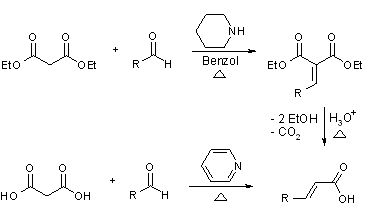Question
Question: Give the following reactions: 1) Benzoin Condensation 2) Knoevenagel Reaction...
Give the following reactions:
- Benzoin Condensation
- Knoevenagel Reaction
Solution
Hint: 1) In Benzoin condensation is an additional reaction involving two aldehydes. The reaction generally occurs between two aromatic aldehydes on glyorals. This reaction is catalysed by nucleophilic such as aynaide or ab N – heterocyclic carbon.
- In Knoevenagel Reaction there is condensation of carbon acid compounds with aldehydes to afford α,β unsaturated compounds. It is a nucleophilic addition of an active hydrogen compound to a carbonyl group followed by a dehydration reaction in which a water molecule is eliminated and this is why it is known as condensation reaction. Product obtained is a conjugated enone.
Complete answer: 1) Benzoin condensation
An example of this reaction is when benzaldehyde is refluxed with aqueous alcoholic potassium cyanide then we obtain an α− hydroxy ketone called benzoin as the product.

2) Knoevenagel Reaction
An example of this reaction is when benzaldehyde condenses with malonic acid in presence of pyridine as a basic catalyst. Here malonic acid and the base present generate a carbanion which acts as a nucleophile and attacks on the benzaldehyde.

Note: A condensation reaction is a closure of an organic addition reaction that typically proceeds in a step –wise fashion to produce an addition product, usually in equilibrium and a water molecule is released. In organic chemistry, nucleophilic substitution is a fundamental class of reaction in which a leaving group is replaced by an electron rich compound and the main involved is called substrate.
